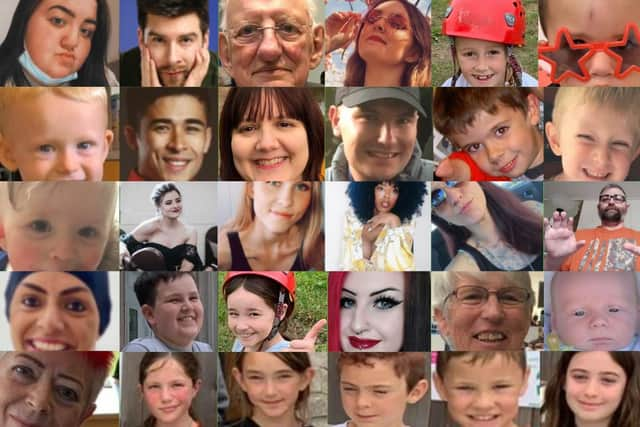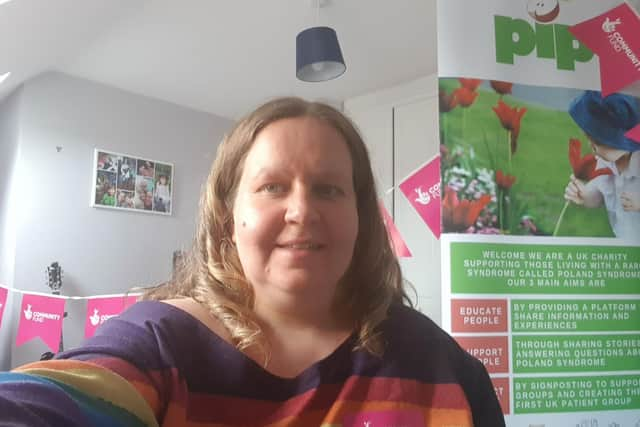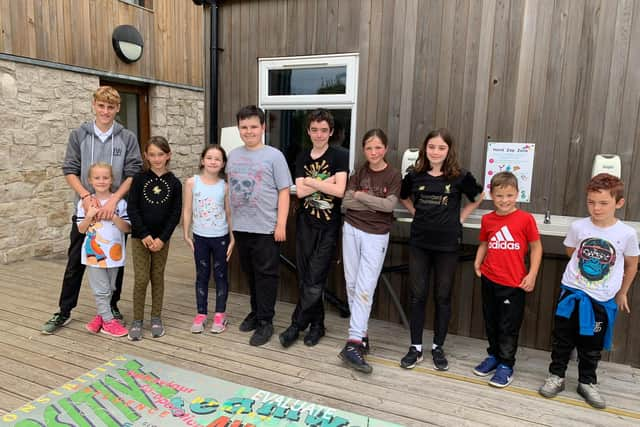Buxton health campaigner celebrates launch of first UK clinic devoted to rare birth difference
and live on Freeview channel 276
It was a dream come true for Sam Fillingham, 40, as she travelled to Birmingham Children's Hospital on Tuesday, December 7, to support families affected by Poland syndrome – 13 years after she first discovered a lack of support for a problem which very few medics will ever encounter.
Poland syndrome is a condition where a child is born with missing or underdeveloped chest muscles, and can also extend to the ribs, shoulder, arm, internal organs and hand along one side of the body. The cause is unknown and, although it affects around one in 20,000 babies, its rarity means that little work has been done to collect data or devote medical attention to it in the UK.
Advertisement
Hide AdAdvertisement
Hide AdSam said: “It was quite emotional to be at the clinic. I was thinking about my journey, and what it would have been like if it had existed when I needed it. It would have felt very different to know that medics cared, understood and wanted to help.


“There was a beautiful moment with two little girls. It was the first time they’d ever met anyone else with Poland syndrome and they held their hands next to each other and they were almost identical. There are so many adults who will never meet someone else like them, so this was pretty magical.”
She added: “I thought this was something we could achieve in another five or ten years, so to come so soon is amazing. I am so proud to be the change that 26-year-old me needed.”
Sam’s son George was born with a relatively mild case of Poland syndrome, but it was still an alarming discovery for a first-time parent.
Advertisement
Hide AdShe said: “It was completely unknown to us and it hadn’t been picked up on any of the scans or at birth. When he was a few days old we noticed his fingers were joined together. The first doctor said it was nothing to worry about, it would be a simple operation, but it was a really difficult experience.


Advertisement
Hide Ad“We had a couple of false hope situations. Several GPs didn’t understand our concerns, we felt unheard and dismissed. Eventually we received a diagnosis.
“A plastic surgeon asked us to take George’s top off, and noticed the difference in his chest. That was another real blow. The surgeon said the hand operation would require a skin graft from George’s groin. He was only a few weeks old and so small, it was really shocking. I found myself with nowhere to go for help and advice, so I started researching better options.”
Thankfully, Sam found a surgeon in Derby who recommended an alternative approach and today George has full function in his hand – although not without complications.
Advertisement
Hide AdSam said: “The worst was over for us and he’s done really well since. But as he’s getting older and everything’s getting bigger, he is getting pain in his hand because some muscles are missing and others have to compensate. It could be a lifelong issue.”


As Sam began to understand more about the condition, the more she wanted to help others. In 2011 she set up the Poland Syndrome Support and Network (PIP-UK) group.
Advertisement
Hide AdShe said: “I didn’t want any family in that situation, left alone to deal with a rare condition, doctors who didn’t recognise it, and no treatment pathway.
“Some of the families we connected with were just like us, struggling to get the right diagnosis for their child. But we also realised that many people had lived much of their lives without a proper diagnosis, leading to low self-esteem and, in the case of women, sometimes a deep sense of shame due to their physical differences, especially in the chest area.”
Advertisement
Hide AdToday PIP-UK has more than 160 members and 2,000 followers all over the world. Sam supports an average ten families per week and organises online resources and in-person events to bring affected families together.
In 2020, PIP-UK became a registered charity, and Sam secured National Lottery funding to work full-time on it for a year – still, a specialist clinic seemed a distant prospect.
Earlier this year Sam started working with Public Health England, which at that point did not even have a data code to record cases of Poland syndrome. Then, Sam was contacted by a group of three surgeons interested in establishing a clinic, and from there a plan formed quickly.
Advertisement
Hide AdShe said: “At the moment this is a pilot programme, not funded by the NHS. The doctors are working on good will. But for the first time Poland syndrome is being acknowledged as something which requires diagnosis and treatment. It will make a world of difference.
Advertisement
Hide Ad“The clinic is multi-disciplinary, so different specialists see each patient in one appointment to work out the best way forward and create a model pathway for all children with Poland syndrome. We want to go further and add mental health support too.”
The surgeons have agreed to hold four more clinics in 2022, with referrals accepted from all over the UK, but beyond that the future is uncertain. In January, PIP-UK will launch a new global database to find people all over the world affected by Poland syndrome and document the impact it has on their lives.
Sam said: “We have to prove that clinics like this are worth investing in for the NHS, and ultimately cost-saving. Unfortunately, like many small charities, our fundraising has completely dried up during the pandemic.
“We are currently seeking corporate sponsors and fundraisers to help support the clinics, if there is anyone out there who could help, please get in touch.”
Advertisement
Hide AdAdvertisement
Hide AdFor more information, visit https://pip-uk.org/ or contact Sam via [email protected].